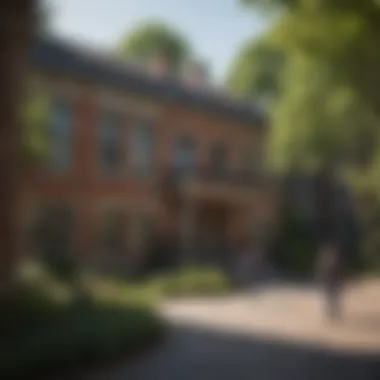Exploring Mercer University Atlanta: A Comprehensive Overview


Intro
Mercer University, situated in Atlanta, Georgia, represents a crucible of academic excellence and historical significance. This institution has grown from its inception in 1833 into a dynamic center for learning and community engagement. Understanding its historical roots, academic offerings, and campus facilities provides valuable insight into its role and impact within the broader context of Atlanta.
As one delves into Mercer University, it becomes clear that the institution is more than just an educational facility. It plays a pivotal role in shaping the cultural landscape of Atlanta. Students and faculty alike contribute to a vibrant community that extends beyond classroom walls. This narrative explores critical facets of the university, covering its architectural elements, academic offerings, student life, and community influence.
By examining these dimensions, this article aims to furnish prospective students, researchers, and community members with a detailed understanding of what makes Mercer University a noteworthy institution of higher learning.
Architectural Inspiration
Mercer University's campus is notable for its stunning architecture, which reflects a blend of historical and contemporary styles. The architectural diversity creates an engaging environment conducive to learning and innovation.
Overview of Design Styles
The design elements at Mercer can be traced back through different periods in American architecture. From the neoclassical influences evident in notable buildings like the Administration Building to the modernist touches present in the library, each structure narrates a story of its own. The synergy between these styles fosters a sense of continuity, while also encouraging new ideas.
Key architectural features include:
- Neoclassical elements: Large columns, symmetry, and elaborate facades.
- Modern designs: Open spaces and eco-friendly materials promote sustainability.
- Functionality: Each building serves a purpose while also blending with its surrounding environment.
Innovative Materials and Techniques
The university's commitment to integrating innovative materials showcases its forward-thinking approach. Use of sustainable building materials and advanced construction techniques not only enhance the structural integrity of buildings but also minimize environmental impact.
Some examples include:
- Recycled materials: Used in construction of recent projects.
- Energy-efficient technologies: Solar panels installed on various buildings.
- Green spaces: Incorporating gardens and outdoor areas enhances the campus experience while promoting biodiversity.
"Architecture is not just about designing buildings; it reflects the values and aspirations of a community."
This architectural philosophy permeates Mercer, attracting students who appreciate both aesthetic and functional design in their educational environment.
Preface to Mercer University Atlanta
Mercer University, located in Atlanta, represents a significant educational hub in the southeastern United States. Understanding this institution is crucial for various stakeholders, including prospective students, parents, academics, and the broader community in Atlanta. This section sheds light on both its current standing and historical significance.
Overview of Mercer University
Founded in 1833, Mercer University is recognized for its commitment to rigorous academic programs and a values-centered education. The university offers a comprehensive range of undergraduate and graduate programs across multiple disciplines, which contributes to its reputation as a respected institution of higher learning. The academic environment fosters critical thinking, collaboration, and a strong sense of community among students and faculty.
Mercer's unique mission emphasizes service, leadership, and ethical reasoning. This approach not only shapes students academically but also cultivates a culture of engagement and civic responsibility. With a diverse student population and a dedicated faculty, the university plays a central role in preparing graduates for both professional success and meaningful contributions to society.
Historical Background
Mercer University has a rich historical legacy that spans nearly two centuries. Established originally in Penfield, Georgia, the institution was named after Jesse Mercer, a prominent Baptist minister. The university initially focused on a liberal arts education, reflecting the educational trends of the time.
In 1871, Mercer relocated to Macon, further expanding its programs and influence. The transition to Atlanta in 1971 marked a pivotal moment, aligning the university with a major metropolitan area. This change has allowed Mercer to enhance its partnerships with local businesses and institutions, thus enriching the academic experience for its students. The evolution demonstrates the institution's adaptability over time while remaining true to its foundational values.
Mercer University’s endearing historical moments, its founding principles, and ongoing advancements provide an essential backdrop to understanding its current role within the educational landscape. It's not just educational advancement that defines Mercer; it's also its commitment to community service and its impact on the local culture.
"Mercer University is not only an academic institution but also a vital component of Atlanta's community, contributing significantly to both education and local culture."
This blend of history and contemporary relevance continues to shape Mercer as a nurturing environment for aspiring students.
Academic Programs and Offerings
Academic programs and offerings at Mercer University Atlanta represent a cornerstone of the institution's identity and mission. The variety and depth of these programs cater not only to a wide range of academic interests but also embody the university's commitment to fostering intellectual growth and professional readiness among its students. In a rapidly evolving educational landscape, understanding these offerings is essential for prospective students who seek to align their academic pursuits with their career aspirations.
Undergraduate Programs
Undergraduate programs at Mercer University encompass a diverse spectrum of disciplines. Students can choose from majors in the liberal arts, sciences, health professions, business, and more. The curriculum is structured to provide both foundational knowledge and specialized skills, which are crucial in today's job market.


The Bachelor of Arts and Bachelor of Science degrees are particularly noteworthy. They emphasize analytical thinking and communication skills, vital components for any professional path. Programs like the Bachelor of Business Administration prepare students with critical skills in management, finance, and marketing. The School of Education offers innovative teacher education programs, prioritizing curriculum design and effective pedagogy.
Moreover, students benefit from close interactions with faculty dedicated to mentorship and research, enriching the educational experience.
Graduate Programs
Mercer University also offers an extensive range of graduate programs. These advanced degrees are designed for individuals aiming to deepen their expertise or switch career paths. The Master of Business Administration (MBA) program stands out for its focus on leadership and analytical skills, appealing to both recent graduates and seasoned professionals.
Graduate programs in the College of Health Professions provide specialized training in fields such as nursing, physical therapy, and public health. Such programs are integral as they respond to the increasing demand for professionals in various healthcare sectors.
Additionally, the university's Cecil B. Day School of Education offers graduate degrees aimed at developing future educational leaders, with courses that reflect modern educational needs and challenges.
Professional Schools
The professional schools at Mercer University further highlight its dedication to practical education. The Walter F. George School of Law is well-respected, emphasizing a rigorous curriculum that prepares students for various legal careers. Notable programs include preparation for leadership roles in public service, business, and dispute resolution.
Likewise, the School of Medicine targets health leaders through an innovative curriculum integrating scientific study and practical application. The school's approach aims to cultivate compassionate and skilled medical professionals ready to address public health challenges.
Campus Infrastructure and Facilities
Campus infrastructure and facilities play a pivotal role in shaping the educational experience at Mercer University in Atlanta. A well-designed campus not only enhances learning but also contributes to student engagement. In this section, we will discuss the library resources, student housing, and recreational spaces available at Mercer University, all essential components of a supportive academic environment.
Library Resources
The library system at Mercer University serves as a cornerstone for academic research and learning. The Jack Tarver Library, the main library on campus, houses a vast collection of books, journals, and digital resources. Students have access to specialized research assistance and various study environments that cater to diverse learning styles.
Key features of the library include:
- Access to Databases: Students can tap into numerous databases for research papers and articles, enhancing their academic work.
- Quiet Study Areas: Designated quiet areas provide students with a conducive space for focused study, catering to those who thrive in solitude.
- Collaborative Spaces: Group study rooms allow for collaborative projects, fostering teamwork among peers.
The library's services, including interlibrary loans and academic workshops, equip students with the necessary tools to succeed in their studies.
Student Housing
Student housing at Mercer University is designed to create a living-learning environment. The residences are strategically placed near academic buildings, easing the commute and encouraging student interactions. Various housing options cater to single students, roommates, and even families, reflecting the diverse needs of the university community.
Features worth noting include:
- Modern Amenities: Many housing units come with fully equipped kitchens, Wi-Fi, and laundry facilities, promoting convenience for residents.
- Community Building: Organized events within housing facilities encourage bonding and community among students, which can significantly enhance their overall university experience.
- Safety and Security: With dedicated security services, Mercer ensures that residents feel secure in their living environment, contributing to peace of mind.
The combination of these factors creates a supportive atmosphere that is critical for academic achievement and personal growth.
Recreational Spaces
Recreational spaces at Mercer University contribute to a holistic educational experience. Physical health and leisure activities are crucial for student well-being, and the campus offers a range of facilities and programs designed to promote an active lifestyle.
Highlights of these recreational facilities include:
- Fitness Centers: Equipped with modern exercise machines and spaces for group classes, fitness centers encourage students to maintain their health.
- Outdoor Facilities: Sports fields and courts provide opportunities for both organized sports and informal games, catering to various interests.
- Wellness Programs: Mercer emphasizes mental well-being through organized wellness programs, encouraging students to engage in activities that reduce stress and improve their quality of life.
In summary, the campus infrastructure and facilities of Mercer University are designed to enhance the student learning experience, promote well-being, and facilitate personal and academic development.
"An effective campus environment is imperative in shaping motivated learners and confident individuals."
These elements reflect Mercer University's commitment to providing an enriching academic atmosphere that nurtures success and encourages student engagement.
Student Life and Engagement
Student life and engagement are vital components of the university experience at Mercer University Atlanta. They provide students with opportunities for personal growth, social interaction, and a deeper connection to their academic environment. Engaging fully in university life helps students to build a sense of community, develop essential life skills, and enhance their overall educational experience.
Student Organizations and Clubs


Mercer offers a broad array of student organizations and clubs, catering to diverse interests and backgrounds. Involvement in these groups can lead to personal and professional development. For example, leadership roles within organizations allow students to cultivate skills such as team collaboration and project management. Students can choose to join clubs focused on academics, arts, or service, among others.
Participation can also expand one's network and establish lifelong connections. Students often find mentorship opportunities within these clubs. Here are some notable aspects:
- Academic Clubs: These focus on specific disciplines and often host guest speakers.
- Cultural Organizations: Groups that celebrate diverse backgrounds foster inclusivity and awareness.
- Recreational Teams: Sports clubs promote physical health and teamwork among peers.
Service Opportunities
Community service is a cornerstone of student engagement at Mercer University. The institution encourages students to participate in various service projects, fostering a sense of responsibility and connection to the community. Engaging in service not only benefits local organizations but also enriches the students’ experience.
Students at Mercer have opportunities to volunteer in:
- Local schools: Tutoring or mentoring younger students.
- Non-profits: Assisting in fundraising efforts or community outreach.
- Health initiatives: Participating in public health campaigns or wellness programs.
These activities can also enhance skills such as empathy, problem-solving, and adaptability. Moreover, students learn to appreciate the challenges facing their communities.
Cultural Events and Activities
Mercer University also hosts a variety of cultural events and activities that enrich the student experience. These events expose students to different perspectives and facilitate discussions around important social issues. Regular programming includes lectures, musical performances, and art displays.
Some highlights of cultural engagement include:
- Annual Festivals: Celebrating various cultures and encouraging participation.
- Guest Lectures: Featuring prominent figures, these sessions provoke thought and discussion.
- Art Exhibits: Showcasing student and professional work increases appreciation for the arts.
Such activities promote not only a vibrant campus atmosphere but also encourage students to appreciate diversity and engage with broader societal issues. Overall, student life and engagement at Mercer University are designed to create a holistic educational experience.
Location and Community
Understanding the location and community surrounding Mercer University is crucial to grasping the full scope of the institution's contribution. This aspect encompasses various elements, including geographical significance, partnerships with local organizations, and the overall impact on the Atlanta community. These factors not only enhance the educational experience for students but also foster a sense of belonging and connectedness within the city.
Geographical Context
Mercer University Atlanta is strategically positioned within a vibrant city known for its rich history and diverse culture. The university is situated in a metropolitan area that offers students access to a plethora of resources. Notably, its proximity to downtown Atlanta creates an ideal environment for academic pursuits mixed with professional opportunities.
The surrounding neighborhoods showcase the dynamic blend of residential and commercial spaces that Atlanta is famous for. Being located in close range to landmarks such as the Martin Luther King Jr. National Historic Park and the Atlanta Botanical Garden provides students with enriching experiences beyond classroom walls. The accessibility to public transport ensures that students can navigate the city effortlessly, making it conducive for internships and job placements.
Partnerships with Local Institutions
Mercer University has established significant partnerships with various local institutions. These collaborations enhance educational offerings and provide students with real-world experiences. Key partnerships include collaborations with health organizations such as the Emory Healthcare and local schools which foster community outreach initiatives.
Such alliances support mutual benefit between the university and the local community. For instance, students in healthcare programs can gain practical experience through internships, while local institutions draw on the university's resources for research and community service projects. This creates a symbiotic relationship that ultimately enriches the educational landscape and builds a sense of shared purpose within the community.
Impact on the Atlanta Community
The influence of Mercer University in Atlanta extends well beyond academic boundaries. The institution actively participates in local cultural events, social initiatives, and economic development programs. The university's commitment to service is evident through various volunteer opportunities for students, often organized in collaboration with local nonprofits.
Moreover, the research initiatives conducted at Mercer contribute significantly to local innovation. This includes advancements in healthcare, education, and technology that benefit both the university and the broader Atlanta society. The university’s graduates often remain in the area, contributing to local economic growth and adding to the community’s cultural fabric.
"Mercer University, through its dedicated students and faculty, embodies the spirit of service and commitment to community that defines Atlanta."
In summary, the geographical positioning, collaborative partnerships, and community involvement of Mercer University create a unique ecosystem that benefits both its students and the Atlanta area. Understanding these elements is essential for prospective students and stakeholders interested in the university's broader impact on society.
Admissions Process
The admissions process at Mercer University Atlanta is a critical gateway for prospective students. It shapes the academic environment and determines the diverse community of learners at the institution. Understanding the admissions guidelines is essential for applicants to prepare their applications effectively. Each aspect of the process offers insights into the university's standards and its commitment to various educational goals.
Requirements for Undergraduate Admissions
Undergraduate admissions require careful attention to several key elements. These include high school transcripts, standardized test scores, letters of recommendation, and personal essays. Students should aim for:
- A minimum GPA in high school, generally around 3.0 on a 4.0 scale.
- SAT or ACT scores that meet Mercer's benchmarks for competitive applicants.
- Extracurricular activities that demonstrate leadership, commitment, and interests beyond academic pursuits.


Prospective students must also consider that admissions is holistic. This means that beyond mere numbers, personal stories and unique experiences are vital. It is advisable for students to present their authentic self through their essays. This element can serve to distinguish applicants from others in the highly competitive pool.
Graduate Admissions Criteria
Graduate programs have distinct criteria, tailored to the specific fields of study. Generally, applicants must:
- Hold a relevant bachelor’s degree from an accredited institution.
- Provide GRE or GMAT scores, depending on the program.
- Submit letters of recommendation from academic or professional references.
In addition to academic performance, candidates are often evaluated based on their professional experiences. Relevant work or research experience can add significant value to an application. Maintaining a clear understanding of each graduate program's specifics is key, as requirements can vary widely.
Financial Aid and Scholarships
Financial aid at Mercer University aims to make education more accessible. Scholarships, grants, and loans are available to help alleviate the cost burden. When applying, students should:
- Fill out the Free Application for Federal Student Aid (FAFSA) promptly.
- Research and apply for Merit-based scholarships, which are often awarded based on academic achievement or specific talents.
- Explore opportunities for Need-based aid, which assesses financial circumstances more deeply.
It is beneficial for students to consider applying for outside scholarships, alongside those offered by the university. Every bit of funding can ease the financial strain of higher education.
In summary, understanding the admissions process at Mercer University Atlanta is vital for both undergraduates and graduates. Each step, from fulfilling application requirements to exploring financial aid options, offers a pathway towards a valuable educational journey.
Notable Alumni and Contributions
The significance of notable alumni and their contributions cannot be overstated when discussing Mercer University Atlanta. Alumni play a crucial role in shaping the university's reputation and enhancing its credibility. The influence of graduates often extends beyond campus borders, impacting their respective fields and communities. Their experiences and successes can provide a valuable lens through which prospective students can gauge the worth of their own educational investments.
Through engagement and support, these graduates contribute back to the university and foster a sense of pride among current students.
Influential Graduates
Mercer University has produced numerous graduates who have excelled in various professions. These influential graduates have made significant contributions to business, politics, science, and the arts.
For instance, M. Douglas McCarty, an accomplished attorney, has played pivotal roles in both state and national advocacy. His work in policy and law has garnered respect from peers and professionals alike. Additionally, Dr. Kay H. Hagan, a notable physician, has impacted healthcare through her dedication to improving medical practices and access in underserved areas.
Individuals like these not only showcase the caliber of education at Mercer but also represent the ideals of leadership and service that the university promotes. Their achievements serve as inspiration for current students looking to forge their paths.
Alumni Networks and Engagement
The alumni network at Mercer University is not just a collection of former students; it is a thriving community that provides ongoing support and resources. This extensive network fosters mentorship opportunities, career development, and collaboration among graduates.
Through various events and programs, alumni can reconnect with classmates and make new acquaintances. Platforms like Mercer Alumni Facebook group have proven invaluable for networking. These spaces allow alumni to share job openings, professional experiences, and industry insights.
Moreover, many alumni engage in philanthropy, contributing financially to scholarships, facilities, and academic programs. Their financial support helps to sustain and expand the university's impact.
"The connection that alumni have with Mercer is lifelong; it embodies a commitment to not just personal success but to the success of future generations."
This deep sense of loyalty underscores the importance of alumni in Mercer University’s mission and contributes to its vibrant and supportive culture.
Closure
The conclusion serves as a vital component of the article by distilling the essence of the research and insights presented about Mercer University in Atlanta. By synthesizing the various elements discussed, readers gain a clear understanding of the unique academic environment and rich culture that the institution embodies.
Reflection on Academic Value
Mercer University Atlanta stands out in many ways. Its academic programs range from health sciences to liberal arts, all dedicated to nurturing critical thinking and practical skills. The value of an education from Mercer goes beyond mere degree attainment. Students develop a deep understanding of their fields, which prepares them for real-world challenges. The supportive faculty encourage curiosity and innovation. In interviews, graduates often cite the strong sense of community as a key factor in their success. This atmosphere fosters collaboration, leading to enriched academic experience and lasting connections.
Moreover, the university's commitment to research and leadership enhances its academic prestige. Students have ample opportunities to participate in groundbreaking projects, further embedding them within the academic fabric of the institution.
The Future of Mercer University Atlanta
Looking ahead, Mercer University is well-positioned to navigate the evolving landscape of higher education. With changing job markets and advancements in technology, the university is adjusting its curricula to meet new demands. Innovations in online learning and interdisciplinary studies promise to expand accessibility and relevance.
The focus on sustainability and community engagement also signals a forward-thinking institution. Partnerships with local organizations are becoming increasingly important, ensuring that students are not only educated but also socially responsible.
"Mercer’s growth strategy is aimed at embracing change while remaining true to its mission of fostering knowledge and service."
As the city of Atlanta continues to thrive, Mercer’s role as a leader in education will likely expand. New programs and initiatives are anticipated, enhancing both academic offerings and community impact. The university's strategic planning endeavors reveal an institution dedicated to adapting, enhancing, and innovating.
In summary, the conclusion emphasizes that Mercer University Atlanta remains a formidable player in the educational sector, committed to nurturing future leaders and fostering a vibrant learning environment.







